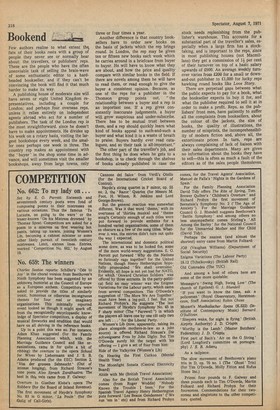Bookend
Few authors realise to what extent thet fate of their books rests with a group of people they never see or normally hear about: the travellers, or publishers' reps. These are the people who have the often unenviable task of selling the brain-wave of some enthusiastic editor to a hardheaded bookseller, and if they can't be convincing the book will find it that much harder to make its way.
A publishing house of moderate size will have seven or eight United Kingdom representatives, including a couple for London; and perhaps four overseas reps, unless it relies entirely on independent agents abroad who act for a number of publishers. The task of the London rep is the most straightforward. since he doesn't have to make appointments. He divides up his week on a rotary basis, visiting the largest bookshops every week, and the smaller ones perhaps one week in three. The country rep makes an appointment with the ' buyer ' in the shop some time in advance, and will sometimes visit the smaller bookshops, away from large towns, only three or four times a year.
Another difference is that country booksellers have to order new books on the basis of jackets which the rep brings round. In London, the rep may be given ten or fifteen new books each week which he carries around in a briefcase from buyer to buyer. He will have to know what they are about, and how the price and quality compare with similar books in the field. If there are novels among them he will have to read them, or read enough to give the buyer a consistent opinion. Because, as one of the reps for a publisher in the Thomson group points out, "the relationship between a buyer and a rep is an important one. If a rep gives consistently inaccurate judgements, a buyer will grow suspicious and under-subscribe. There has to be mutual trust between them, and a rep should quickly learn what kind of books appeal to such-and-such a buyer and what kind it is a waste of breath to praise. Buyers hardly ever read catalogues, and so their task is all-important."
The other part of the traveller's job, and the first thing he does when he gets to a bookshop, is to check through the shelves of books already published in case the stock needs replenishing from the publisher's warehouse. This accounts for a substantial part of the traveller's sales, especially when a large firm has a stocktaking, and is important to the reps, since in most publishing houses (not Macmillans) they get a commission of 11 per cent of their turnover on top of a basic salary upwards of £900. An average weekly turnover varies from £200 for a small or downand-out publisher to £1,000 for lucky reps hawking round books like Love Story.
There are perpetual gaps between what the public expects to pay for a book, what the bookseller expects to buy it for, and what the publisher required to sell it at in order to make a profit. Reps, as the publishers' front men, have patiently to suffer all the complaints from booksellers, about the colour of the jackets, the size of books, the quality of illustrations, the number of misprints, the incomprehensibility of modern fiction and, above all, the extortionate prices. In turn, reps are always complaining of lack of liaison with their sales departments. Many are given no information about the books they have to sell—this is often as much a fault of the editors as of the sales people themsleves.


































 Previous page
Previous page